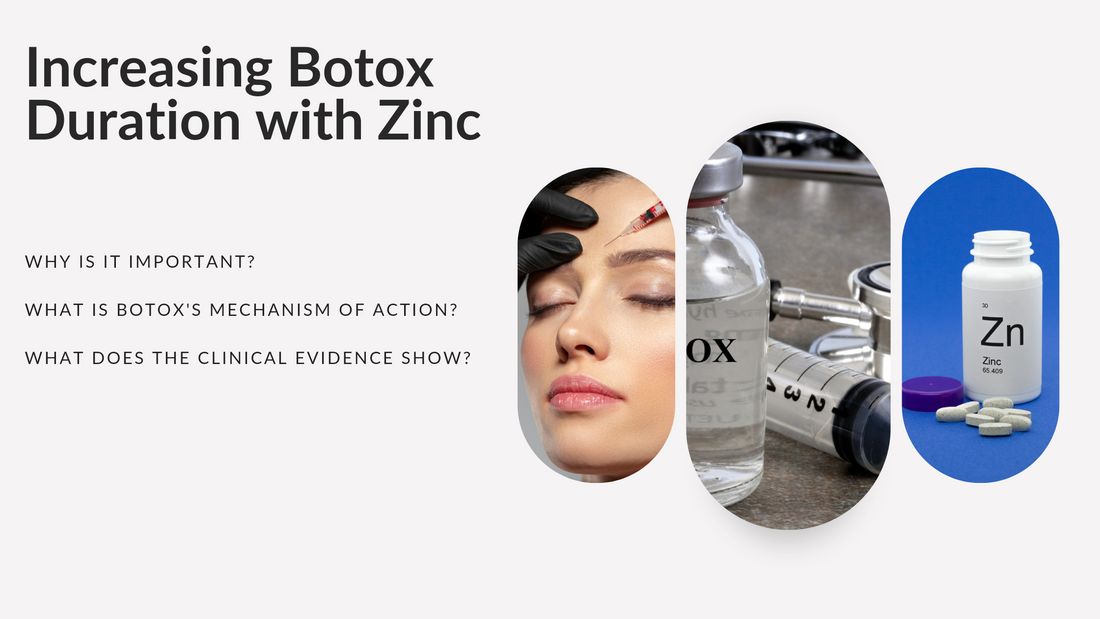
Increasing Botox Duration with Zinc
Cerebral TorqueShare
Botulinum toxin injections are used to treat a variety of medical conditions. Even though we are concerned with migraine, the main mechanism by which botulinum toxin works in regards to the local paralysis of muscle is the same. The toxin acts by blocking neurotransmitter release at the neuromuscular junction, causing this localized paralysis. While toxin effects typically last 3-4 months, there is definitely a need to increase the length of the therapeutic effectiveness of the drug. One possible strategy to do so is with zinc supplementation. We will go into detail on why this is important to address then get into the mechanisms of Botox and how zinc supplementation can modulate the effects of Botox.
Why it’s Important to Extend Botox Duration
Botox injections are an important preventive treatment option for many patients with chronic migraine. However, studies and anecdotal evidence both suggest that the benefits of Botox may wear off before the recommended 12-week retreatment schedule for a majority of patients.
A retrospective study published in Headache examined the prevalence and features of Botox “wear-off” in 143 chronic migraine patients treated at a specialty headache center. The results showed that over 60% of patients experienced worsening migraines in the 6 weeks leading up to their next scheduled Botox session- meeting criteria for wear-off phenomenon.
The high rate of wear-off has significant implications for migraine management. During the wear-off period, patients required additional clinic visits for bridge therapies like nerve blocks and IV medications to treat their breakthrough headaches. This increased utilization of healthcare resources could be avoided if the duration of Botox effects could be extended.
These findings also illustrate the need for strategies like zinc supplementation to prolong the efficacy of Botox for chronic migraine. Extending the benefits of Botox could significantly improve outcomes and quality of life for chronic migraine patients by reducing their disability and need for acute treatments during the wear-off period.
Currently, clinicians may decide to increase the dosage of Botox or increase the frequency of Botox injections so that they are before the 12 week cut-off. Unfortunately, while health insurance is a hurdle in this regard, there is also the increased risk of patients developing neutralizing antibodies to Botox. Therefore, in an effort to help patients with chronic migraine by increasing the dosage and/or frequency of Botox injections, the clinician may actually inadvertently cause the patient to stop responding to Botox- albeit a rare phenomenon.
Botulinum Toxin Mechanism of Action
Botulinum toxin is produced by the bacterium Clostridium botulinum and comes in several serotypes (A-G). For medical use, serotype A is most common. The toxin is taken up into nerve terminals at the neuromuscular junction via endocytosis. Inside the nerve terminal, the light chain portion of the toxin has protease activity which cleaves one of the SNARE proteins required for synaptic vesicle fusion.
Specifically, botulinum toxin A cleaves SNAP-25. By cleaving this essential SNARE protein, the toxin prevents synaptic vesicles from fusing with the nerve terminal membrane and releasing acetylcholine. This blocks neuromuscular transmission, leading to paralysis of the muscle.

Botox Dependency of Zinc
The protease activity of botulinum toxin is zinc-dependent. Zinc binds and activates the catalytic site of the light chain, enabling it to cleave its target SNARE protein. Without bound zinc, the protease has little activity.
Over time, as the initially bound zinc atoms dissociate or are removed, the catalytic activity declines. The toxin loses its ability to cleave SNARE proteins. This leads to a wearing off of its paralytic effects as neurotransmission can resume.
Boosting Toxin Duration with Zinc
The zinc-dependence of botulinum toxin protease activity provides the rationale for zinc supplementation. By increasing the available zinc within the nerve terminal at the time of toxin internalization, the idea is that the catalytic activity can be prolonged.
Essentially, more zinc present early on could enable the toxin to continue cleaving SNARE proteins for a longer duration. This would extend its inhibitory effect on neurotransmission and result in longer-lasting paralysis.
Research has shown that many older adults have suboptimal dietary zinc intake. Thus, zinc deficiency could be a factor limiting botulinum toxin efficacy in some patients. For such individuals, supplementing with zinc prior to or during toxin administration may provide additional zinc to bind to the internalized toxin molecule, sustaining its protease activity.
Clinical evidence for Zinc Supplementation Increasing Botox Duration
While promising in theory, clinical evidence for zinc supplementation is still preliminary.
However, a recent systematic review published in the Journal of Trace Elements and Minerals examined whether zinc supplementation could enhance the effects of Botox injections for facial muscles.
The systematic review identified two randomized controlled trials with a total of 123 participants. One trial conducted in the United States found that 50 mg/day of zinc citrate with added phytase increased the duration of Botox treatment for hemifacial spasms, blepharospasms, and cosmetic wrinkles by 29.6% compared to placebo.
The other study, performed in Egypt, reported that 50 mg/day of zinc gluconate without phytase increased the prevalence of commissure smiles following Botox injection compared to placebo.
Because of the quality of the studies and small sample size, the use of supplemental zinc remains without strong evidence. It does warrant further research to clarify if optimized zinc levels may benefit select patients undergoing Botox for chronic migraine.
Final Thoughts
If you, like many chronic migraine patients that receive Botox, experience wear-off, ask your neurologist about the possibility of supplementing with zinc. It is important to ask your provider about the dose and timing of the zinc because, as explained above, giving zinc after the injection may likely be too late to bind to much of the internalized toxin. You want extra zinc to be present at the time the toxin enters the neuron and begins cleaving SNARE proteins. The initial zinc atoms bound in the neuron are what keep the toxin active after injection. Of course, this may not be for everyone and, thus, please ask your neurologist before taking any supplementation.


